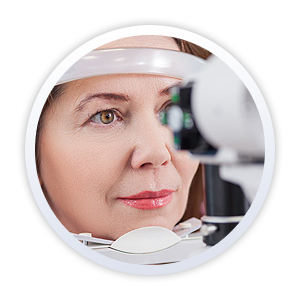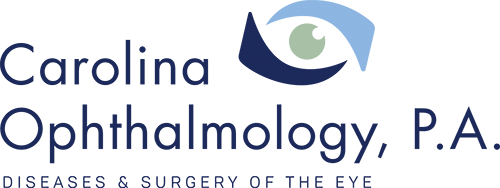Approximately 25 million Americans have cataracts, which cause cloudy, blurry or dim vision and often develop with advancing age. This June, Carolina Ophthalmology, PA joins the American Academy of Ophthalmology in observing Cataract Awareness Month. We will be sharing three things everyone should know about this diagnosis and its treatment.
As everyone grows older, the lenses of their eyes thicken and become cloudier. Eventually, they may find it more difficult to read street signs. Colors may seem dull. These symptoms may signal cataracts, which affect about 70 percent of people by age 75. Fortunately, cataracts can be corrected with surgery. Ophthalmologists, physicians who specialize in medical and surgical eye care, perform around three million cataract surgeries each year to restore vision to those patients. Get an idea of what someone with cataracts might experience with this cataract vision simulator. The following are a few important facts about this condition.
Things To Know
- Most everyone will develop cataracts with age. However, recent studies show that lifestyle and behavior can influence when and how severely you develop cataracts. Diabetes, extensive exposure to sunlight, smoking, obesity, high blood pressure and certain ethnicities have all been linked to increased risk of cataracts. Eye injuries, prior eye surgery and long-term use of steroid medication can also result in cataracts. If you have any of these or other risk factors, talk to an ophthalmologist.
- Wearing UV-blocking sunglasses and brimmed hats when outside can help. Several studies suggest that eating more vitamin C-rich foods may delay how fast cataracts form. Also, avoid smoking cigarettes, which have been shown to increase the risk of cataract development.
- During the procedure, the natural clouded lens is replaced with an artificial lens called an intraocular lens. This lens should improve your vision significantly. Patients have a variety of lenses to choose from, each with different benefits. Studies have shown that cataract surgery can improve quality of life and reduce the risk of falling. If cataracts are interfering with your ability to see well, consider asking your ophthalmologist about cataract surgery.
A life-changing surgery
At age 49, Michael Sargent’s vision had become so impaired by cataracts that he couldn’t distinguish shapes or colors without his glasses on, even if objects were right in front of him. His ophthalmologist recommended cataract surgery.
“Having the surgery was life-changing,” says Sargent, who lives in Cherry Hill, New Jersey. “I can see everything from the time on my alarm clock to a bird’s nest in a tree hundreds of feet away without glasses. It’s the most amazing experience I’ve ever had.”
“If cataracts aren’t disrupting your life, you can probably wait and have surgery when they really start to bother you,” says Mark Joseph, M.D., a cataract and cornea surgeon at Carolina Ophthalmology. “But for those who have started to notice decreased vision or glare, cataract surgery may be one the best things they can do for themselves.”
For more information about eye health and how to protect your eyes, visit the patient education section on Carolina Ophthalmology’s website.
.About Carolina Ophthalmology, PA:
Carolina Ophthalmology was founded in 1980 and since that time has grown to become one of the foremost ophthalmic centers in the country with offices located in Hendersonville, Asheville, Skyland and Columbus, and satellite locations in Franklin and Spruce Pine, NC. Collectively, their doctors have over one hundred (100) years of experience serving the people of Western North Carolina. To schedule an appointment with one of their qualified surgeons or for more information, please call 800-624-6575 or visit their website at www.carolinaeyemd.com




